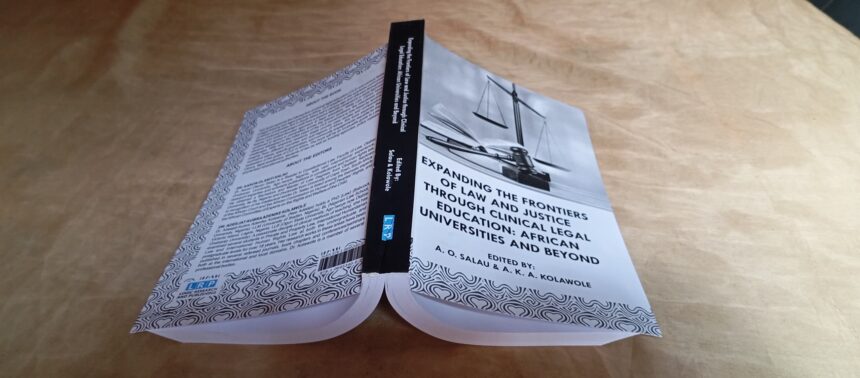The book, Expanding the Frontiers of Law and Justice through Clinical Legal Education: African Universities and Beyond, edited by Aaron O. Salau and Adeejat-Kubra A. Kolawole, is a work that examines the rise and impact of Clinical Legal Education (CLE) in Africa.
Unlike traditional legal texts, this book focuses on practical, hands-on training, showing how law clinics in universities are preparing the next generation of lawyers to address real-world challenges.
The book goes beyond theory, exploring the integration of CLE into university curricula, the evolution of law clinic networks across the continent, and the societal impact of experiential legal learning. It positions CLE as a critical tool for producing lawyers who are both competent and socially conscious.
Why Lawyers Should Care
Legal education in Africa has historically prioritised theory over practice, often leaving graduates underprepared for real-life legal work. According to the authors, CLE changes this by allowing students to handle real cases, engage with communities, and develop both professional and ethical competencies.
Salau and Kolawole demonstrate how this model not only strengthens student skills but also advances access to justice, upholds human rights, and fosters democracy.
For practising lawyers, educators, and policymakers, understanding CLE’s trajectory is essential for contributing to a more effective, responsive legal system.
The Book’s Chapters
Chapter 1: Forging Empathetic and Proficient Lawyers in Africa
Written by Aaron. O. Salau and Adeejat-Kubra A. Kolawole, this chapter traces the origins of Clinical Legal Education (CLE) in Africa, highlighting how student-run law clinics and community law centres provide hands-on training, pro bono legal services, and exposure to socio-cultural aspects of law. CLE helps develop empathetic, skilled lawyers while addressing gaps in legal services for underserved communities.
Chapter 2: Confronting the Questions of Institutionalization of Clinical Legal Education and Standardization of Law Clinics in Nigeria
By Charles O. Adekoya, this chapter examines the challenges of institutionalising Clinical Legal Education (CLE) and standardising law clinics in Nigeria. It highlights gaps in curriculum integration, inconsistent clinic operations, and obstacles that limit practical training. The authors provide insightful recommendations to ensure CLE delivers skills-ready, practice-oriented lawyers and aligns with societal needs.
Chapter 3: An Examination of Ethical Issues in the Management of Law Clinics in Nigeria
By Abubakar Suleiman, this chapter explores the ethical challenges in managing law clinics in Nigeria. Using Ahmadu Bello University Law Clinic as a case study, it highlights how law students provide pro bono services while navigating professional ethics. The authors recommend clearly defined ethical rules to guide students, ensuring CLE fosters both practical skills and integrity in future lawyers.
Chapter 4: Developing Ethical Legal Practice — The Role of Clinical Legal Education in Nigeria
By A. P . Mbagwu, this chapter examines how Clinical Legal Education (CLE) fosters ethical legal practice in Nigeria. It shows how experiential learning, client interaction, and reflective practice help law students develop ethical awareness, professional responsibility, and sound decision-making skills. The authors offer practical recommendations for enhancing CLE, ensuring the next generation of Nigerian lawyers is both competent and ethically conscious.
Chapter 5: Deep Culture Learning — A Required Resource for Clinical Legal Practice
By Anthony O. Oyero and Pascal I. Sodelola, this chapter highlights the importance of deep culture learning in law clinics. It shows how understanding unspoken values, beliefs, and cultural dynamics equips law students with the skills needed to practice law effectively in diverse, technology-driven environments. The authors emphasise that integrating deep cultural awareness into CLE enhances legal proficiency and practical lawyering skills.
Chapter 6: CLE and Law Clinic — A Response to Systemic Challenges in Developing African Jurisdictions
By Charity E. Unogwu, this chapter explores how Clinical Legal Education (CLE) and law clinics address systemic legal and justice challenges in developing African countries. The authors highlight CLE’s role in tackling issues like under-resourced legal aid, limited legal awareness, outdated curricula, and institutional fragility. Using examples from Nigeria and South Africa, the chapter shows how CLE promotes experiential learning, social justice, and the development of socially conscious legal professionals.
Chapter 7: Clinical Legal Education — Advancing Justice and Practical Knowledge of Law in Nigeria
By Toyin Majekodunmi, this chapter demonstrates how Clinical Legal Education (CLE) enhances access to justice and practical legal knowledge in Nigeria. By exposing systemic flaws in the legal system, CLE equips law students to address inequalities, uphold human dignity, and strengthen the justice system. The authors highlight CLE’s role in producing lawyers who are socially conscious, skilled, and ready to make a tangible impact in society.
Chapter 8: Clinical Legal Education and Immigration Law in African Universities — Structure, Impact and Challenges
By Olu Asekun, this chapter examines how Clinical Legal Education (CLE) supports immigration law practice in African universities. Using case studies from South Africa, Uganda, Nigeria, and Kenya, it shows how CLE helps law students assist migrants, refugees, and asylum seekers, while enhancing their practical skills. The authors highlight CLE’s impact on access to justice and policy reforms and discuss challenges such as financial constraints and regulatory limitations, offering recommendations to expand its effectiveness.
Chapter 9: Riding the AI Wave or Risking Obsolescence? — Why Nigerian Legal Professionals Must Engage the Future
By Babatunde Oni and Ibrahim Obadina, this chapter explores the impact of artificial intelligence (AI) on the Nigerian legal profession. It highlights both the opportunities for efficiency in legal research, contract analysis, and case management, and the risks of falling behind if lawyers fail to adapt. The authors emphasise that Nigerian legal professionals must develop technology literacy and interdisciplinary skills to stay relevant in a rapidly evolving legal landscape.
Chapter 10: Climate Justice, Action and Litigation — Opportunities for Law Clinics in African Universities
By Aaron O. Salau, this chapter explores how African university law clinics can advance climate justice and sustainable development. It highlights opportunities for students to engage in climate advocacy, litigation, and community action, despite limited resources. The authors show how CLE can equip future lawyers with practical skills to address Africa’s climate challenges, aligning legal education with global sustainability goals.
Chapter 11: Impact of Clinical Teaching Methods in Legal Education and Training in Nigeria
Written by Oluwakemi A. Ayanleye, Adekunbi O. Johnson-Odusanya, Idowu Adegbite, and Adeejat-Kubra A. Kolawole, this chapter evaluates how clinical teaching methods transform legal education in Nigeria. Using Olabisi Onabanjo University as a case study, it highlights the limitations of traditional lecture-based teaching and demonstrates how CLE equips students with practical skills, experiential knowledge, and readiness for real-world legal practice. The authors show that CLE bridges the gap between theory and practice, producing competent and practice-ready lawyers.
Chapter 12: The Role of Law Clinics in Protecting the Rights of Children in Nigeria
By R. E. Badejogbin and H. L. Haruna, this chapter examines how university law clinics protect children’s rights and improve access to justice in Nigeria. Through doctrinal and empirical research, the authors highlight the effectiveness of law clinics in addressing legal issues affecting vulnerable children, while offering recommendations to strengthen their impact. CLE is shown to empower future lawyers to become advocates for children’s welfare and rights.
Chapter 13: Broadening the Frontiers of Access to Justice in Indigent Rural Communities
By Temilade O. Jolaosho and Ebunoluwa B. Osisanwo, this chapter highlights how Clinical Legal Education (CLE) expands access to justice for marginalized rural communities in Nigeria. By involving law students in providing free legal aid, CLE bridges the “legal poverty” gap, empowers vulnerable populations, and strengthens the rule of law. The authors also discuss challenges like resource constraints and offer strategies to enhance CLE’s impact in rural areas.
Chapter 14: Street Law — A Vehicle for Re-Inventing Customary Arbitration in Multi-Cultural Nigerian Suburban Communities
By Yakusak Aduak, this chapter explores how Street Law initiatives in university law clinics can modernise customary arbitration in multicultural Nigerian suburbs. Using the Dendu community in Yola South as a case study, it highlights how student-led advocacy integrates traditional arbitration norms with formal rules, enhancing dispute resolution, enforceability, and access to justice.
Chapter 15: Law Clinics Navigating the Period of the Pandemic: The University of Ibadan Women’s Law Clinic During COVID-19 Lockdown as Case Study | Ridwan Adelaja
By Oluyemisi Bamgbose, Olaoluwatofunmi T Bamgbose, and Olutosin S Olajubu, this chapter examines how university law clinics adapted during the COVID-19 pandemic, using the University of Ibadan Women’s Law Clinic as a case study. It highlights the spike in human rights abuses, particularly domestic violence, and shows how CLE continued to provide access to justice despite lockdowns. The authors offer recommendations for sustaining legal clinic operations during health emergencies.
Where the Impact Is Felt
The authors say CLE doesn’t just benefit students. It directly impacts communities, legal systems, and societal governance.
Law clinics documented in the book serve as platforms for student engagement, public legal education, and pro bono service, ensuring that legal education has tangible, measurable outcomes.
Legal experts say Salau and Kolawole critically examine curriculum transformation, institutional support, and management strategies, providing a blueprint for how universities can successfully implement and scale CLE programmes.
Talking Points
It is impressive that the book, edited by Aaron O. Salau and Adeejat-Kubra A. Kolawole provides a comprehensive exploration of Clinical Legal Education (CLE) in Africa, combining research, case studies, and practical insights from law clinics across the continent.
This book positions CLE as not just an academic exercise but a practical tool for addressing gaps in legal services, empowering students to deliver pro bono services, assist marginalized communities, and develop hands-on legal skills.
At Techparley, we see how the insights from this book could reshape legal education in Africa, moving it from traditional theory-based teaching to a learner-centred, justice-oriented model that equips students for real-world practice.
The book highlights how CLE programs help students navigate systemic challenges, ethical dilemmas, and socio-cultural dynamics, demonstrating the impact of experiential learning on producing competent, empathetic, and socially conscious lawyers.
With the right adoption and collaboration among universities, law faculties, and stakeholders, the ideas in this book have the potential to transform legal education in Africa and expand justice to underserved communities.





